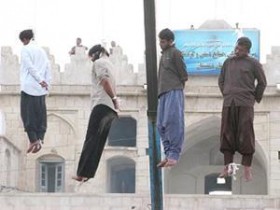Last Wednesday, three men convicted of drug related charges were hanged in prison in the Iranian city of Isfahan, state media reported. The prisoners died unnamed; only the charges and the fact of their execution were mentioned.
 That’s par for the course for the Islamic Republic, which in recent years has emerged as one of the world’s most prolific executioners of drug offenders. Hundreds were sent to the gallows for drug offenses last year (a final tally isn’t in yet) and nearly 500 the year before that, and, according to Iranian human rights sources and state media reports compiled by the anti-death penalty group Hands Off Cain, 21 more were executed in January alone, bringing the total so far this year to 24.
That’s par for the course for the Islamic Republic, which in recent years has emerged as one of the world’s most prolific executioners of drug offenders. Hundreds were sent to the gallows for drug offenses last year (a final tally isn’t in yet) and nearly 500 the year before that, and, according to Iranian human rights sources and state media reports compiled by the anti-death penalty group Hands Off Cain, 21 more were executed in January alone, bringing the total so far this year to 24.
It’s a grim litany:
- Five prisoners executed January 30 at the prison in Kerman for “armed trafficking of 53 kilograms and 250 grams of opium”
- One man hanged January 28 at the prison in Mianeh for selling 890 grams of crack. In addition to being executed, this unnamed man was fined $3 million rials for being a drug addict.
- Six prisoners, including two women and one Afghan, hanged January 27 in Esfahan after being convicted of drug trafficking
- One man identified only as “Ch.P.” hanged January 24 at Sharoos Prison for trafficking 1.94 kilograms of morphine
- Three prisoners identified only by their initials fined, lashed, and hanged January 23 at Qazvin Prison for “possession and trafficking of narcotic drugs”
- Two prisoners, “M. Sh.” and M. F.,” hanged January 16 at Semnan Prison for trafficking 6.732 grams of crack and 1,739 grams of crack and 30.8 grams of crystal meth, respectively
- Two prisoners hanged January 6 in Khomarabad for “possession and trafficking of drugs”
- One unnamed prisoner hanged January 2 in the prison at Yasouj for trafficking 20,050 ampules of heroin and 74,917 “psychotropic pills.”
The practice of imposing the death penalty for drug offenses is frowned upon by the United Nations, which considers it a human rights violation. That stance is even embraced by the UN Office on Drugs and Crime.
“UNODC advocates the abolition of the death penalty and calls upon Member States to follow international standards concerning prohibition of the death penalty for offenses of a drug-related or purely economic nature,” the international agency said in 2010 report (see page eight).
The Iranian resort to the death penalty for drug offenses has attracted international condemnation from the likes of Amnesty International and the Norway-based human rights group Iran Human Rights, which in 2011 helped launch the International Campaign Against the Death Penalty in Iran.
More broadly, Harm Reduction International has an ongoing Death Penalty Project aimed at the 32 countries that have laws on the books allowing the death penalty for drug offenses. Opponents of the death penalty for drug offenses argue that such statutes violate UN human rights laws, which say the death penalty can be applied only for “the most serious crimes.”
Article republished from Stop the Drug War under Creative Commons Licensing









